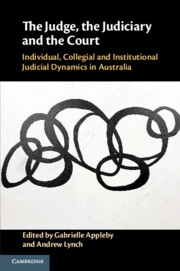 The Judge, the Judiciary and the Court
The Judge, the Judiciary and the Court Book contents
- The Judge, the Judiciary and the Court
- The Judge, the Judiciary and the Court
- Copyright page
- Contents
- Figures
- Tables
- Contributors
- Foreword
- Cases
- Part I The Judge, the Judiciary and the Court
- 1 The Judge, the Judiciary and the Court
- 2 Re-examining the Judicial Function in Australia
- 3 The Chief Justice
- Part II Debates and Challenges to the Judicial Role
- Part III The Judiciary as a Collective
- Part IV Perceptions
- Index
3 - The Chief Justice
Under Relational and Institutional Pressure
from Part I - The Judge, the Judiciary and the Court
Published online by Cambridge University Press: 04 May 2021
- The Judge, the Judiciary and the Court
- The Judge, the Judiciary and the Court
- Copyright page
- Contents
- Figures
- Tables
- Contributors
- Foreword
- Cases
- Part I The Judge, the Judiciary and the Court
- 1 The Judge, the Judiciary and the Court
- 2 Re-examining the Judicial Function in Australia
- 3 The Chief Justice
- Part II Debates and Challenges to the Judicial Role
- Part III The Judiciary as a Collective
- Part IV Perceptions
- Index
Summary
This chapter examines the role and responsibilities of a chief justice. Using the judicial legitimacy values propounded by Richard Devlin and Adam Dodek, we argue that a ‘successful’ chief justice will promote and protect these values as they negotiate and manage the many relational dimensions of the role with other judges, with the executive, the Parliament, the profession, the academy, the media, and the wider public. Our study highlights interpretative disputes, including as to whether an individual chief justice has responded to genuine, as opposed to improperly perceived, threats to judicial values and about how a chief justice might best navigate between the values, particularly as new values, such as representativeness and efficiency, can appear in opposition to more traditional values. Such questions are symptomatic of ongoing disagreement about the fragility of judicial values, particularly independence, as well as the subjective nature of any attempt to evaluate judicial performance. We argue that there is a need for a more developed normative framework to better understand – and critique – the individual choices and actions of chief justices.
Keywords
- Type
- Chapter
- Information
- The Judge, the Judiciary and the CourtIndividual, Collegial and Institutional Judicial Dynamics in Australia, pp. 50 - 80Publisher: Cambridge University PressPrint publication year: 2021
- 1
- Cited by


